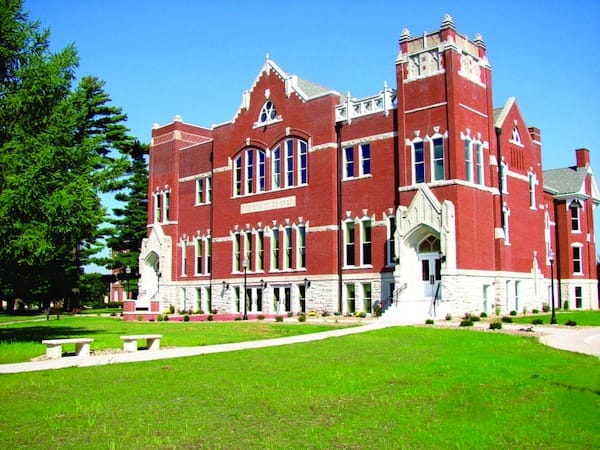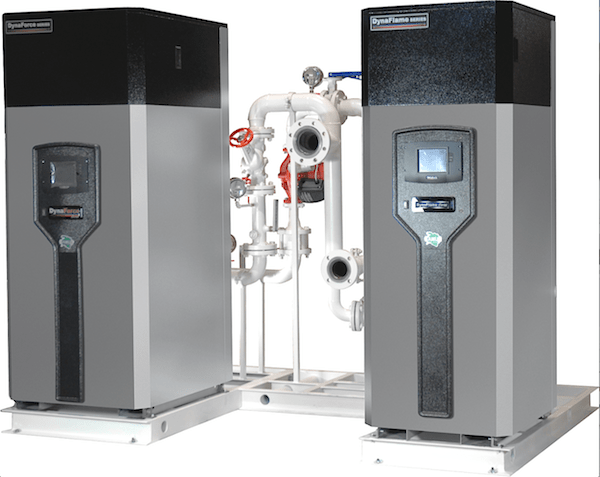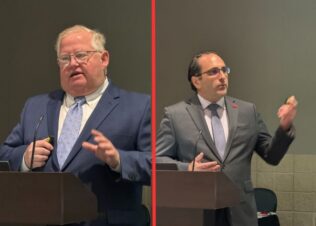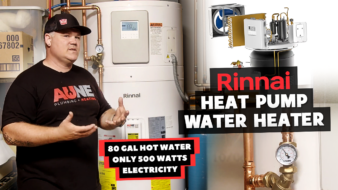In its distinctive role among the many institutions of learning in America, Iowa Wesleyan College adheres to the ideals of its founding vision of social justice and human welfare on the local and international level by seeking to decrease its carbon footprint. In an attempt to bring a cleaner, greener and a more cost efficient heating system to their school, Iowa Wesleyan, in conjunction with Energy Systems Group, decided to replace their existing, centralized hydronic heating system with several more efficient, complete packaged boiler and primary piping pump systems from Metropolitan Industries.

ESG designed a system so that each building’s heating system would have equipment pre-assembled and manufactured for ease of installation. ESG decided Metropolitan Industries, the leading manufacturer of complete boiler and primary piping pump systems, was the right supplier for equipment development and construction. The campus upgrades also included additional geothermal heating/cooling facilities.
“After a few discussions about the design, we decided to provide high-efficiency, pre-packaged hybrid boiler systems assembled on prefabricated skids with the associated primary piping and pumps,” said Metropolitan’s HVAC Sales Manager Matt Brickey. “This type of design would allow for ease of installation by the contractor and reduce installation time dramatically. We realized moving the prefabricated system through the tight hallways and doorways posed a challenge, so the system was designed so that it could be manufactured in a way that split the skid in three different spots allowing for easier moving and maneuvering around tight spaces.”

Pictured are the new hybrid boiler system package and the primary piping pump system recently installed at Iowa Wesleyan’s Science Hall.
The custom designed and engineered boiler systems were installed in five campus buildings: The McKibbin Dormitory, Student Union, Science Hall, Campus Library and the newly-renovated Chapel. In the McKibbin Dormitory and Student Union, hybrid boiler systems with heat exchangers were also packaged on the systems to satisfy the domestic hot water load.
High efficiency air separators manufactured by Spirotherm® were utilized to remove unwanted air that may have found its way into the system during the installation process. Spirovent® technology is designed to address all forms of air (entrapped, entrained and dissolved) that can be found in closed loop systems and remove nearly all of it. The coalescing medium creates a low velocity area inside the Spirovent® that allows air bubbles to rise and dirt to sink. There are no strainers, filters or replacement parts that can potentially become clogged. The flow always remains constant, without a high-pressure drop.
The end result is increased distribution efficiency, component life and heat transfer capabilities, along with decreased oxygen-based corrosion and pump cavitation, and the elimination of air related noises within the entire piping system.
How can you benefit using two different boilers?
In regards to Iowa Wesleyan’s energy consumption concerns, the primary reason for utilizing a modulated conventional boiler AND a condensing boiler is simple–together they are more efficient, have a lower initial cost and last longer.
For Iowa Wesleyan, the implementation of the hybrid boiler system was the ideal solution for their new heating system. They were able to save some upfront costs by purchasing a “standard” efficiency boiler, but were still able to benefit with the energy savings through the use of the high efficiency condensing boiler when conditions would allow.
Combustion air temperature also affects the net efficiency of the combustion process. Cold combustion air will absorb more energy released from burning the fuel than warmer combustion air; meaning colder combustion air reduces the efficiency of the appliance.
Lower return water temperatures and lower flue gas temperatures provide the best condensing operation. The condensing boilers recover the latent heat that is usually lost by harvesting the energy that is created when the water vapor in the flue gas is turned into a liquid.
When a customer’s boiler system is more efficient, it will not only save the customer money each year, it will also decrease their carbon footprint. The efficiency of the boiler system in part depends on the temperature of the return water. When the return water temperature is 130 degrees Fahrenheit (54.4 degrees Celsius) and above, the control system will run the conventional boiler. At 129 degrees Fahrenheit (53.9 degrees Celsius) and below, the control system will run the condensing boiler. The savings are maximized in temperate climates where winters are cold and summers are warm.
When the system uses the condensing boiler, the amount of usable, sensible heat that is generated is significantly larger than that of a conventional boiler system–creating true system efficiency.
Why not just use condensing boilers?
It may seem as if the perfect boiler system would simply use condensing technology. But if return water temperatures are too high, the condensing boiler will be only as efficient as a conventional type boiler. In a condensing boiler, when the temperature of the return water is too high and the air temperature is too cold, it will not allow a condensing boiler to operate in condensing mode. Initial capital costs can be reduced with a hybrid system by combining a lower cost conventional boiler with a premium efficiency condensing boiler.
Due to Iowa Wesleyan’s upgrades, carbon emissions are expected to reduce, which will translate into savings in total energy costs.
Every customer’s needs are unique and Metropolitan can tailor the solutions to meet your needs.
“What’s nice about these systems is that they’re completely customized to the client’s needs,” said Brickey. “Metropolitan Industries can configure the piping, boilers and system components in any manner to ease the installation process for a new or retrofit application.”
In the case of Iowa Wesleyan College, the savings are significant.






Join the conversation: